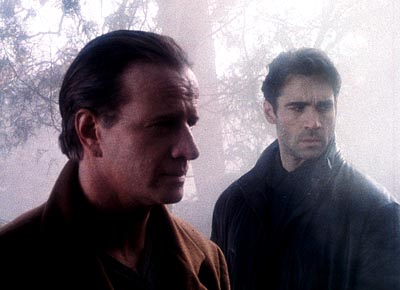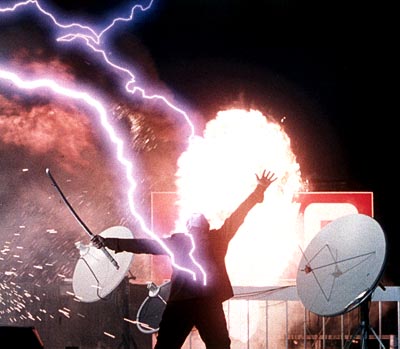

What is this whole Highlander thing? Remember the original movie back in 1986? The one with Sean Connery? It attracted enough fans to spawn a couple sequels and two television shows (one lasting six years, the other flopping partially in its first). This quiet juggernaut returns to the big screen, this time combining the Highlander television series with the Highlander movies. In the world of Highlander, there are immortals. The only way to kill them is to decapitate them. When an immortal kills another, they take all the power of the dead immortal. So the more kills one has, the more powerful one is. It is some sort of game, where "in the end, there can be only one." Basically, it serves as an outlet for people who want to see guys with swords and trenchcoats running around killing other people. The good thing is that fans of the movies and the series will enjoy this (supposedly last) installment. For anybody new to this mythology, it will most likely make no sense to them.
Connor MacLeod (Christopher Lambert, Highlander III: The Sorcerer, Mortal Kombat), the central character of the movies, and Duncan MacLeod (Adrian Paul, Convergence, Susan's Plan), the central character of the series, finally team up. This time, an immortal is going renegade. Kell (Bruce Payne, Passenger 57, Dungeons & Dragons) is disobeying the rules of the game. He is killing people on neutral territory (so-called holy ground) and teaming up on immortals when battles should be one-on-one. He is very powerful, more so than Connor and Duncan combined. Back when Connor and Kell were both mortal, they knew each other. Things happened, and needless to say, the two are not happy with each other. Kell is trying to punish Connor for wrongs against him that he will not forget. Because Kell is renegade, he is even more dangerous than other immortals. So it becomes a cat-and-mouse game between Connor, Duncan, and Kell.
Highlander: Endgame manages to effectively capture the spirit of both the movies and the television series, and combines them without taking away what made them popular. Screenwriter Joel Soisson (Mimic II), along with help from William Panzer and others, take the Highlander story and actually move it forward, paving the way for possible future sequels (they say this is the last, but...). They do deserve credit for taking their "their can be only one" credo seriously, and also for making a story where the ending is not immediately apparent. In terms of quality, there is a reason that the sequels were direct-to-video and the series appeared late at night on the weekends. This is not highbrow material. Highlander: Endgame does not raise the bar, it merely keeps it level. Perusing the resumes of the cast and crew reveal a cornucopia of direct-to-video movies, the ones that always are new at the local videostore that no one has ever heard of before.
Director Douglas Aarnioski does give some interesting visuals, but much of everything else is subpar. Because of their long lives, most Highlander episodes/movies delve into the past, usually to expand on stories and/or characters. Aarnoiski's use of flashback becomes excessive, in effect distracting people from the main story. He could also tone done the blatant foreshadowing and heavy montage use. Small appearances by regulars in the television series will also appeal to fans but mean nothing to others. The script contains some prime examples of horrible dialogue, and some of the delivery does not help, especially Lambert's. Here, he is brooding and gloomy, always tilting his head down and squinting his eyes to make himself attempt to look more serious. Paul is a little better, but not by much. At best, Highlander: Endgame is a guilty pleasure.